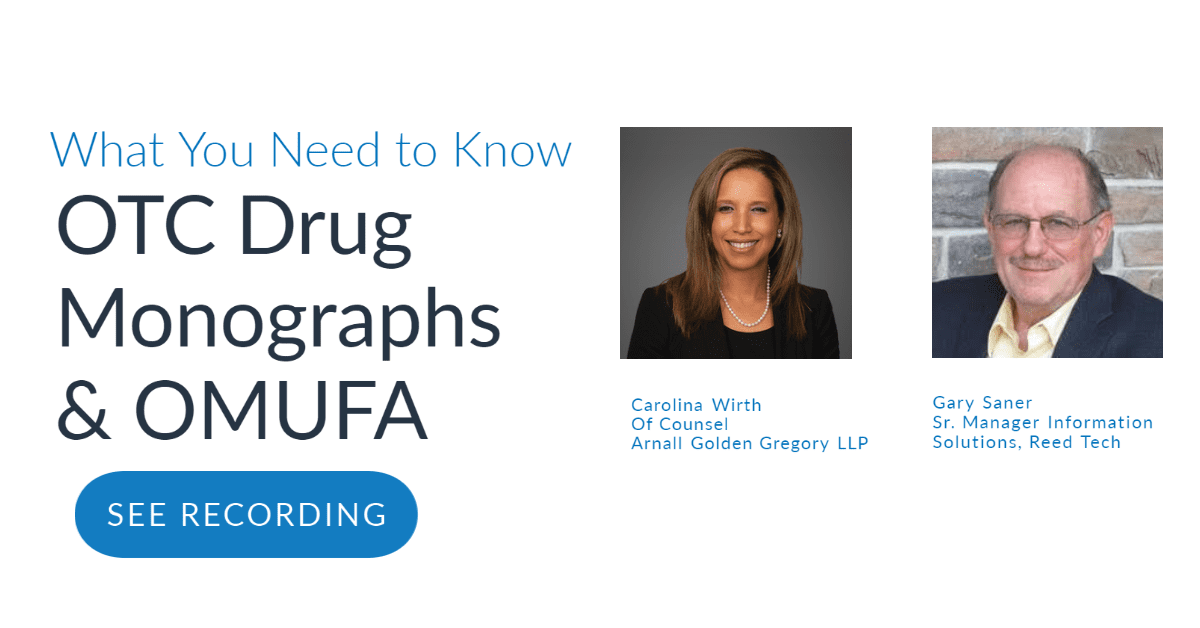For a thorough briefing on the latest with OTC Drug Reform and the CARES Act, we had a conversation with Carolina Wirth, Of Counsel, at Arnall Golden Gregory, LLP. The presentation was hosted by Gary Saner, Senior Manager, Information Solutions, Reed Tech and recorded as a live event with FDANews.com.
These experts helped attendees to understand how the Coronavirus Aid, Relief, and Economic Security Act (CARES Act), passed in March 2020, modernizes the FDA Over-the-Counter (OTC) Drug Review Process and its impact on the industry, including current and future OTC Drug Products. They also fielded many audience questions about the changes. The entire webinar, including the Q&A, is available for viewing here.
Below are some key takeaways that Mr. Saner and Ms. Wirth cover in the recording.
1. Acronyms you need to know:
- OTC – Over the Counter
- CARES – Coronavirus Aid, Relief and Economic Security Act
- OMOR – OTC Monograph Order Request
- OMUFA – OTC Monograph User Fee Act
- GRASE – Generally recognized as safe and effective
- DFL – Drug Facts Label
- NDA – New Drug Application
- ANDA – Abbreviated New Drug Application
- CMO – Contract Manufacturing Organization
- PLD – Private Label Distributor
2. Procedural Changes with OTC Monograph Reform
A cumbersome rulemaking process has been replaced by OTC Monograph Order Request (OMOR), a significantly streamlined process. OTC Monographs will be republished as Final Administrative Orders. The reform includes an exclusivity provision (18 months for new ingredients or use). Future commercial marketing is also affected by category I, II or III assignments under the old OTC Drug Review system.
3. New fees associated with the CARES Act
OTC Monograph User Fee Act (OMUFA) authorizes the FDA to collect User Facility Fees from OTC drug manufacturers. This is similar to user fees paid by prescription drug product manufacturers and sponsors. If the OTC Monograph Drug Product does not comply or is manufactured in a facility for which fees are not paid, the product is considered misbranded. The annual payment amount has yet to be determined.
- FDA fiscal year 2021 (Oct 1, 2020 – Sep 30, 2021): The fee is due on the first business day of July 2020 or 45 calendar days after publication of a Federal Register Notice, whichever comes later
- After fiscal year 2021: The fee will be due the first business day of June or the first business day after the enactment of an appropriations act providing for the collection and obligation of fees for the year, again, whichever comes later
OTC Monograph User Fee Act (OMUFA) also allows for the FDA to collect fees for the review of OTC Monograph Order Requests (OMOR). OTC drug sponsors need to pay a fee, with some exceptions, when submitting an OMOR for FDA review.
- Tier 2 requests are minor changes including the reordering of existing information in the Drug Facts Label (DFL) and the modification of the “Directions for Use” section of the DFL. The annual payment for a tier 2 request is $100,000
- Tier 1 requests are all of the requests that do not qualify for Tier 2. This includes the addition of a new ingredient to a monograph that already has one or more ingredients that have been found to be GRASE and the addition of a new indication to a monograph that already has one or more ingredients that have been found to be GRASE, and the new indication applies to one or more of the GRASE ingredients. The annual payment for a tier 1 request is $500,000
4. Impacts of OTC Monograph Reform
Existing marketed OTC products: Final Monographs remain in place (renamed “Final Administrative Orders”). Whereas, tentative Final Monographs (Category I) are now “Final Administrative Orders” (Enforcement discretion is no longer available). In general, no Labeling changes are necessary if the product meets the current Final Monograph or Tentative Final Monograph. There will be no impact on products marketed pursuant to a New Drug Application (NDA) or Abbreviated New Drug Application (ANDA).
OTC Monograph Establishment Registrations: These registrations must be current and accurate. On March 23, 2017, the Business Operation Qualifier C106645 “Manufactures human over-the-counter drug products” was removed from the eDRLS system and replaced with more specific qualifiers.
5. Industry Action Items
In order to stay compliant, there are several actions that need to be taken. You will want to familiarize yourself with the new OTC Drug Monograph Regulations and understand the future status of your OTC monograph drugs to avoid misbranding. It is also important to confirm or update OTC Establishment Registrations, this includes updating OTC Business Operation Qualifiers as needed, and OTC Drug Product Listing (note: CMO and PLD need to coordinate). There is an annual registration period for both of these submission from October 1 through December 31. Finally, prepare for Annual OTC Monograph User Fees plus a significant fee if requesting an OTC Monograph Order Request (OMOR).
To learn more about OTC Drug Reform & the CARES Act, check out the full webinar or contact [email protected].

